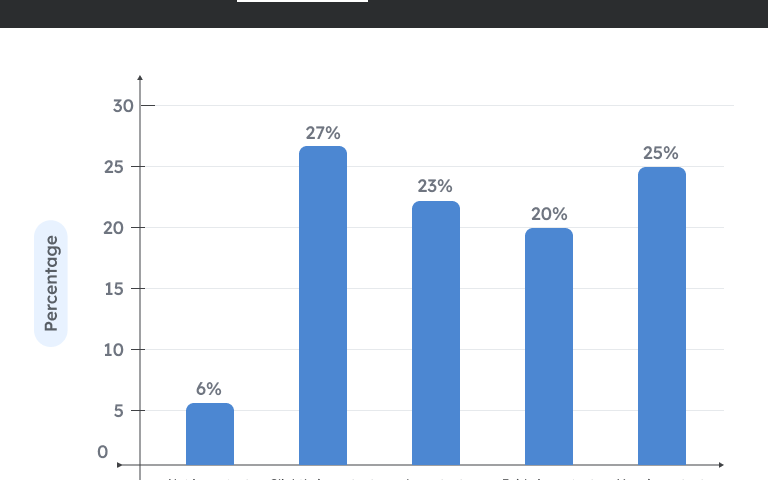We surveyed 625 hiring managers from a range of small businesses (less than 100 employees) to large companies (1000+ employees) across the US about their thoughts on cover letters. Adding to data from other studies, we’ve aggregated the most comprehensive range of cover letter statistics online, and our certified HR experts provide thoughts regarding the importance of cover letters in 2023.
Are cover letters important? (19 statistics)
You’re about to submit a job application when you see “Cover letter optional” in the job posting. Is it optional — or will it actually be a strike against you if you don’t submit one? And when it’s required, you wonder if hiring managers even really read them. We asked hiring managers if job seekers actually need a cover letter.
- On a spectrum of importance, 25% of hiring managers surveyed indicated a cover letter is ‘Very important’ when deciding whether to invite an applicant for an interview. This is in contrast to only 6% of hiring managers who believe a cover letter is ‘Not at all important’ when choosing candidates to interview.
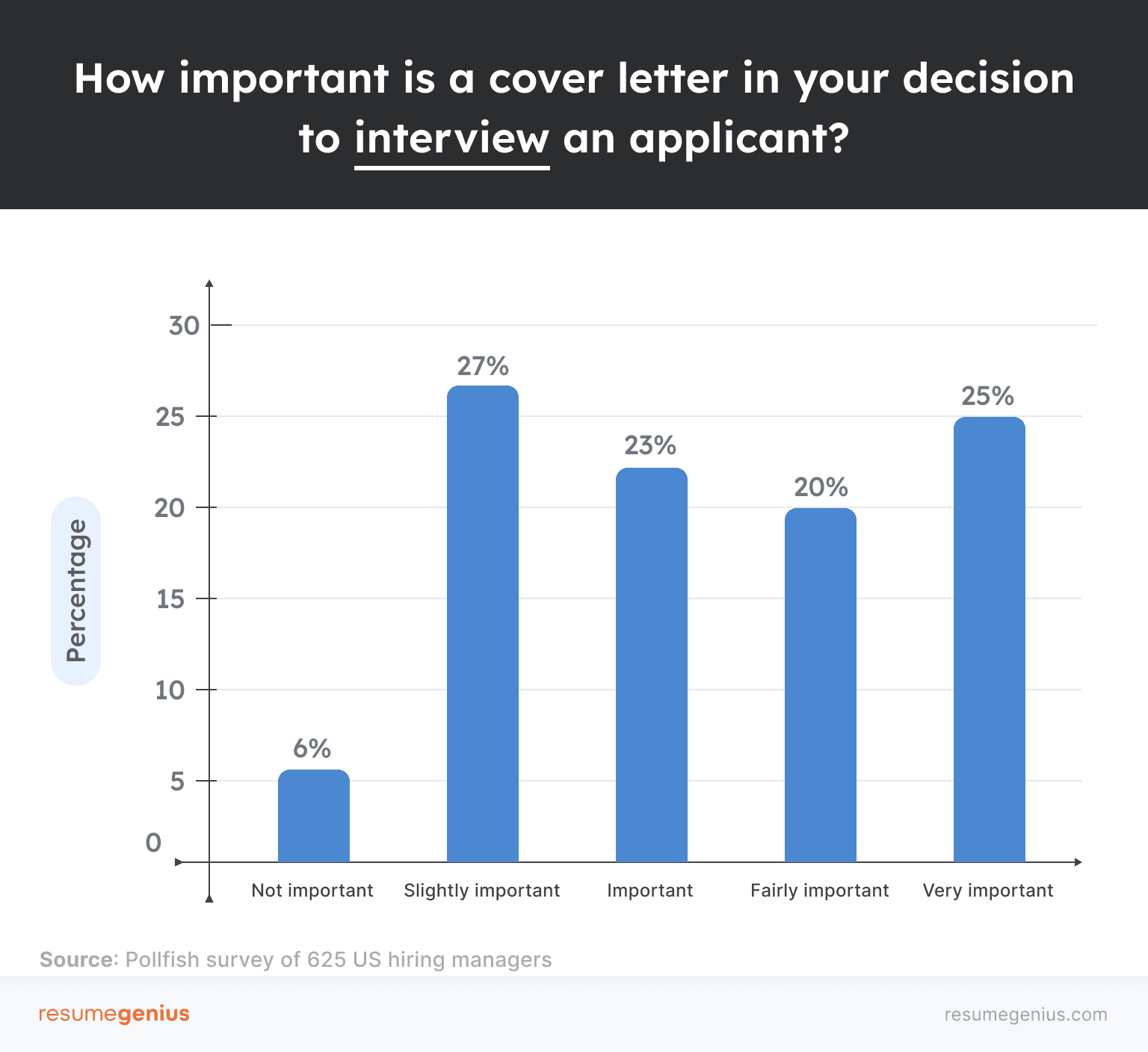
- 83% of hiring managers surveyed by ResumeLab reported that cover letters are important in their hiring decisions1.
- Medium and large companies (100+ employees) are more than 2 times as likely as small companies to think a cover letter is ‘Very important’ (34% of medium and large companies vs. 15% of small businesses).
Do companies require cover letters?
- 60% of companies surveyed require a cover letter.
- 48% of ‘tech giants’ (tech companies with 5000+ employees) require a cover letter2.
- 55% of medium-sized tech companies (501-1000 employees) require a cover letter2.
- 65% of tech start-ups (1-200 employees) require a cover letter2.
- Medium and large companies are more likely to require cover letters (72% and 69%, respectively) than small businesses (49%).
Do hiring managers actually like cover letters?
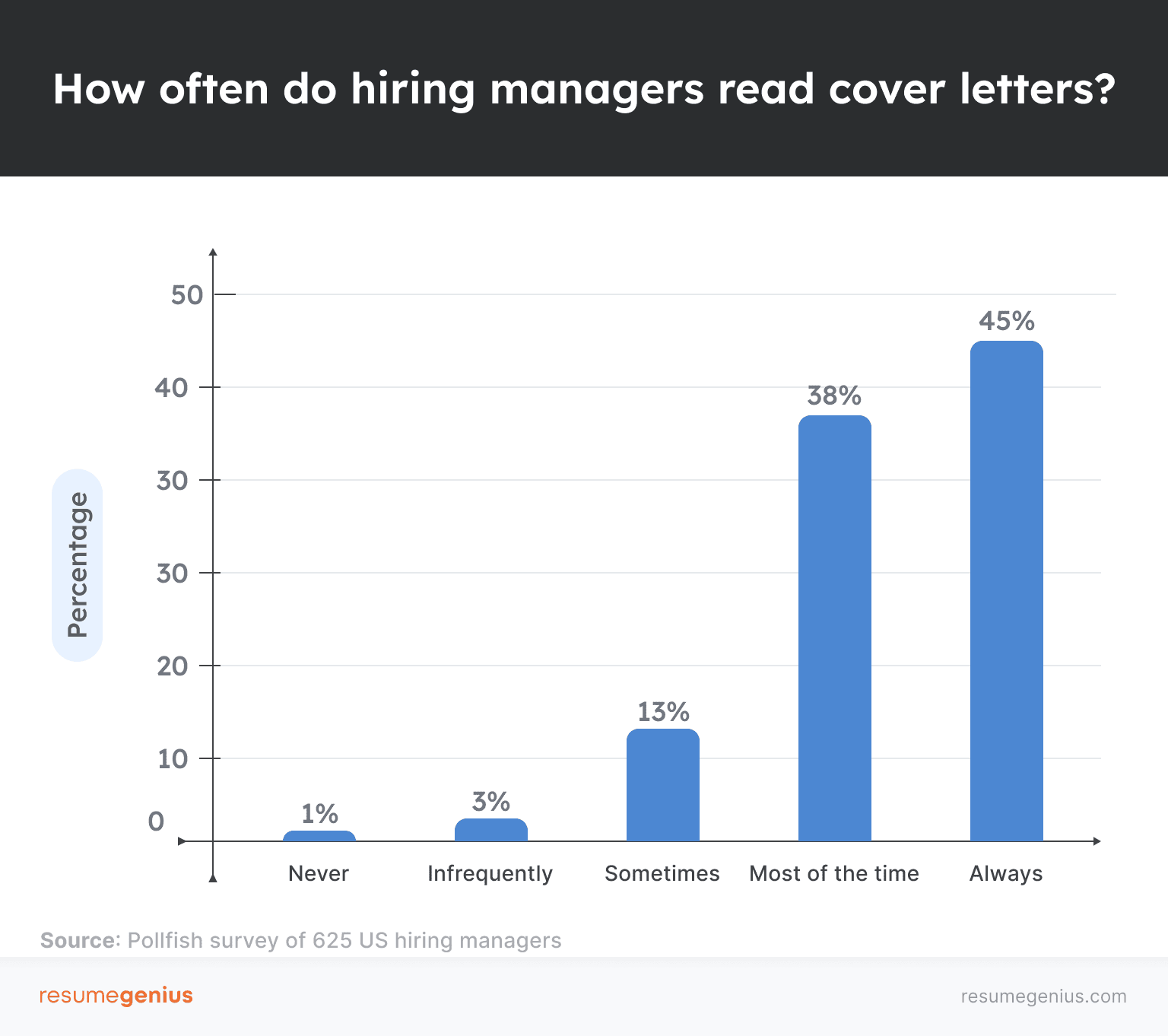
- 78% of recruiters prefer applicants to submit a cover letter3.
- 87% of hiring managers surveyed by ResumeGo read cover letters4.
- According to ResumeGo, 59% of hiring managers believe a cover letter can provide valuable insights into an applicant (compared to 22% and 16% of hiring managers who only read cover letters out of habit or to be thorough, respectively)4.
- Of the hiring managers we surveyed, 83% frequently or always read cover letters. In contrast, 4% never or infrequently read cover letters.
- 45% of hiring managers surveyed read an applicant’s cover letter before their resume.
- 36% of hiring managers spend less than 30 seconds reading a cover letter.
- 48% of hiring managers spend between 30 seconds to 2 minutes reading a cover letter.
- 15% of hiring managers will even spend upwards of 2 minutes on a cover letter.
- Among companies who don’t require applicants to submit a cover letter, 73% said they frequently or always read the cover letters they do receive.
- 74% of hiring managers surveyed by ResumeLab said they read cover letters when the job posting requires applicants to submit them1.
- 72% of hiring managers expect applicants to submit a cover letter even if the job posting says doing so is “optional”1.
Expert takeaway: cover letters are still important today
Cover letters are required at more than half of the companies we surveyed. And if you’re applying to a medium to large company, chances are even higher you’ll need a cover letter. With more applicants per position, larger companies likely use cover letters to help differentiate between similarly qualified applicants.
Simply put, hiring managers read cover letters (83% read 50-100% of the cover letters they receive). Even hiring managers from companies who don’t require cover letters reported reading the cover letters sent in by applicants. As a result, you can benefit from submitting a cover letter even when it’s not required.
Additionally, the vast majority of hiring managers (95%+) consider cover letters at least slightly important when deciding who to interview. And hiring managers from medium and large companies find cover letters are especially important, with 34% each of medium and large companies reporting cover letters as very important in their interview-granting decisions.
Hiring managers do more than just skim your cover letter too, with 63% spending greater than 30 seconds reading a cover letter. Plus 45% of hiring managers actually read a cover letter before a resume, suggesting the cover letter is not a forgotten or after-thought part of your application.
How do hiring managers use cover letters? (19 statistics)
By understanding what hiring managers are looking for from your cover letter, you can write a relevant and effective letter.
- 49% of hiring managers expressed that a strong cover letter can convince them to interview an otherwise weak candidate.
- 18% of hiring managers said a weak cover letter can cause them to throw out the application of an otherwise strong candidate.
- 33% of hiring managers say a good letter can elevate a weak applicant, and a bad letter can hurt a strong applicant.
- Of hiring managers that always read cover letters, 58% said a strong cover letter can help a weak candidate. Of hiring managers who infrequently read cover letters, 33% said a strong cover letter can boost the application of a weak candidate.
- 83% of hiring managers surveyed by ResumeLab stated that a good cover letter can earn you an interview, even if your resume isn’t good enough1.
What is the purpose of a cover letter?
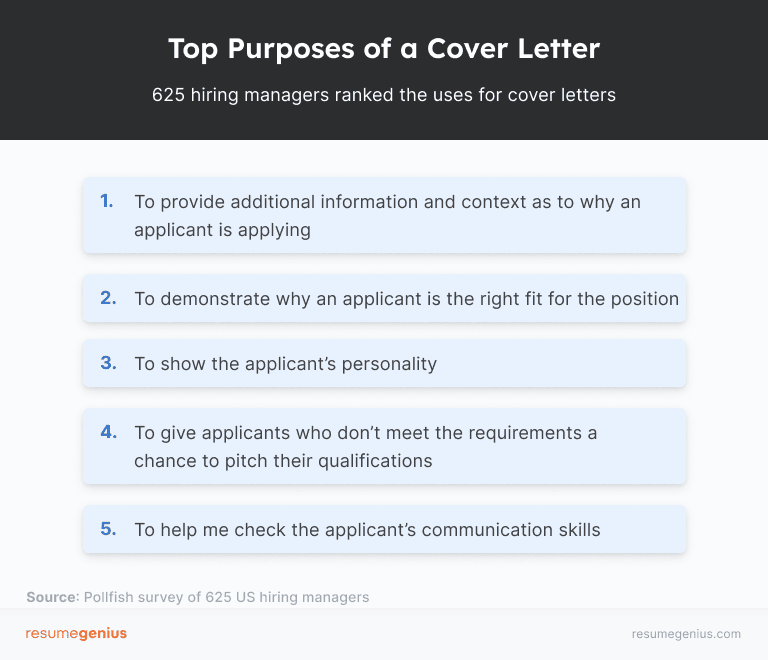
The Resume Genius survey results
- According to all hiring managers surveyed, the #1 purpose of a cover letter is to provide additional information and context as to why a person is applying for the position.
- Among hiring managers from small companies (less than 100 employees), the top purpose for a cover letter is for the applicant to demonstrate why they’re the right fit for the position.
- Among hiring managers from medium-sized companies (101-1000 employees), the top purpose for a cover letter is for the applicant to show their personality.
- Among hiring managers from large companies (1000+ employees), the top purpose for a cover letter is for the applicant to provide additional information and context as to why they’re applying for the position.
The ResumeLab survey results
In 2019, ResumeLab asked 200 hiring managers about the purposes of a cover letter.
- 63% of respondents said explaining your motivation for joining a company is an important purpose of a cover letter1.
- 50% of respondents said outlining your career objectives is an important purpose of a cover letter1.
- 50% of respondents said explaining why you’re changing careers is an important purpose of a cover letter1.
- 49% of respondents said explaining gaps in your employment is an important purpose of a cover letter1.
- 47% of respondents said showcasing your achievements is an important purpose of a cover letter1.
GetCoverLetter’s survey results
In 2020, GetCoverLetter surveyed 2,000 recruiters. Of the recruiters who prefer that applicants submit cover letters,
- 47% said they prefer cover letters because it shows an applicant is motivated3.
- 30% said they prefer cover letters because a cover letter provides additional information about an applicant3.
- 23% said they prefer cover letters because a cover letter shows an applicant’s personality3.
How important is a cover letter for an internal position?
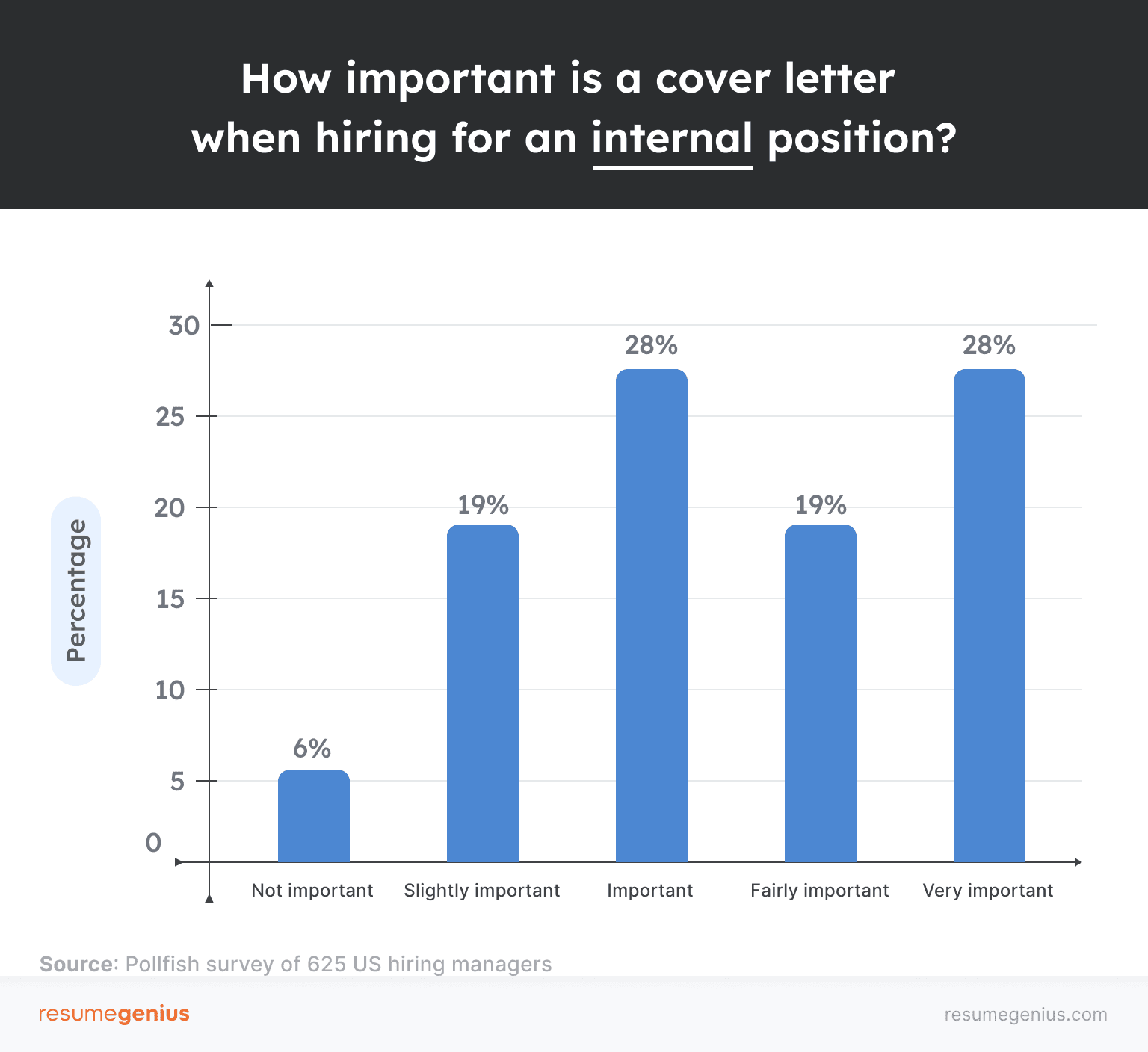
- 47% of those surveyed classified a cover letter for an internal position as fairly to very important compared to 25% who classified it as not at all important or only slightly important.
- Hiring managers from medium-sized companies (100-1000 employees) were more likely than those from small or large companies to report a cover letter as fairly or very important when hiring for an internal position (62% of hiring managers from medium-sized companies compared to 53% and 35% from large and small companies, respectively).
Expert takeaway: cover letters can be a tipping factor for your application
Company size, overall hiring needs, the exact nature of the open position, and personal biases are just a few factors that can influence how a hiring manager perceives your cover letter.
But generally, hiring managers agree that a persuasive cover letter can increase a weak applicant’s chances of getting an interview. Also, our survey data indicated that hiring managers overall view cover letters as important when hiring for internal positions. As a result, career changers, first-time job seekers, and internal applicants should submit a cover letter even if it’s not required.
Hiring managers voted ‘giving context as to why the person is applying’ as the main purpose of a cover letter. But hiring managers ranked the other purposes of a cover letter very closely, suggesting that a good cover letter can — and should — achieve multiple goals, including describing your fit with the company, showing your personality, and demonstrating your communication skills.
Our survey data suggested that different-sized companies have different motivations for reading cover letters. For example, small companies were more focused on using a cover letter to determine an applicant’s fit, which on a small team is essential when a single person may have to take on several roles and teamwork is crucial.
How to write a cover letter hiring managers approve of (17 statistics)
Now that you know how important it is to write a great cover letter, these 16 statistics will help you avoid common mistakes regarding cover letter customization, formatting, length, and more.
Do I need to customize each cover letter to the job?
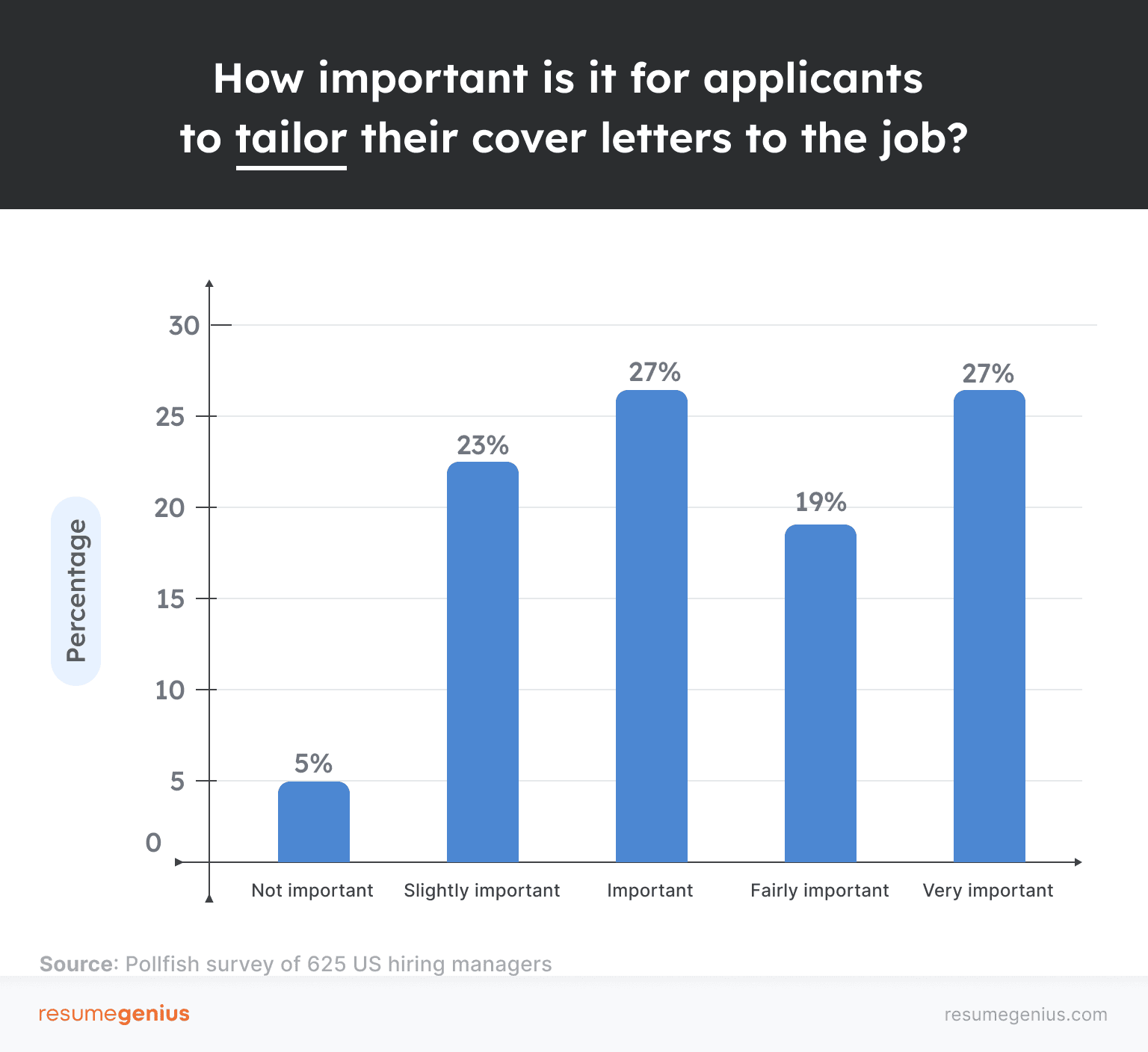
- 27% of hiring managers surveyed consider customizing a cover letter to be very important, compared to 5% who consider tailoring to be not at all important.
- 81% of hiring managers surveyed by ResumeGo said they significantly preferred customized over generic cover letters4, and 78% from the same survey said it is easy to tell when an applicant has invested time into tailoring their cover letter4.
- Medium and large companies (100+ employees) were approximately 2 times as likely as small companies to consider tailoring your cover letter as very important.
- Customizing the skills you mention in your cover letter to those listed in the job posting was ranked as the most important customization to make to your cover letter.
- 36% of male compared to 23% of female hiring managers believe it’s very important to mention the company’s goals in your cover letter.
- 30% of male compared to 24% of female hiring managers believe it’s very important to specify the company’s name in your cover letter.
- Medium and large companies (100+ employees) were approximately 1.5 times as likely as small companies to consider customizing your cover letter with skills from the job posting as very important.
How should I address and submit my cover letter?
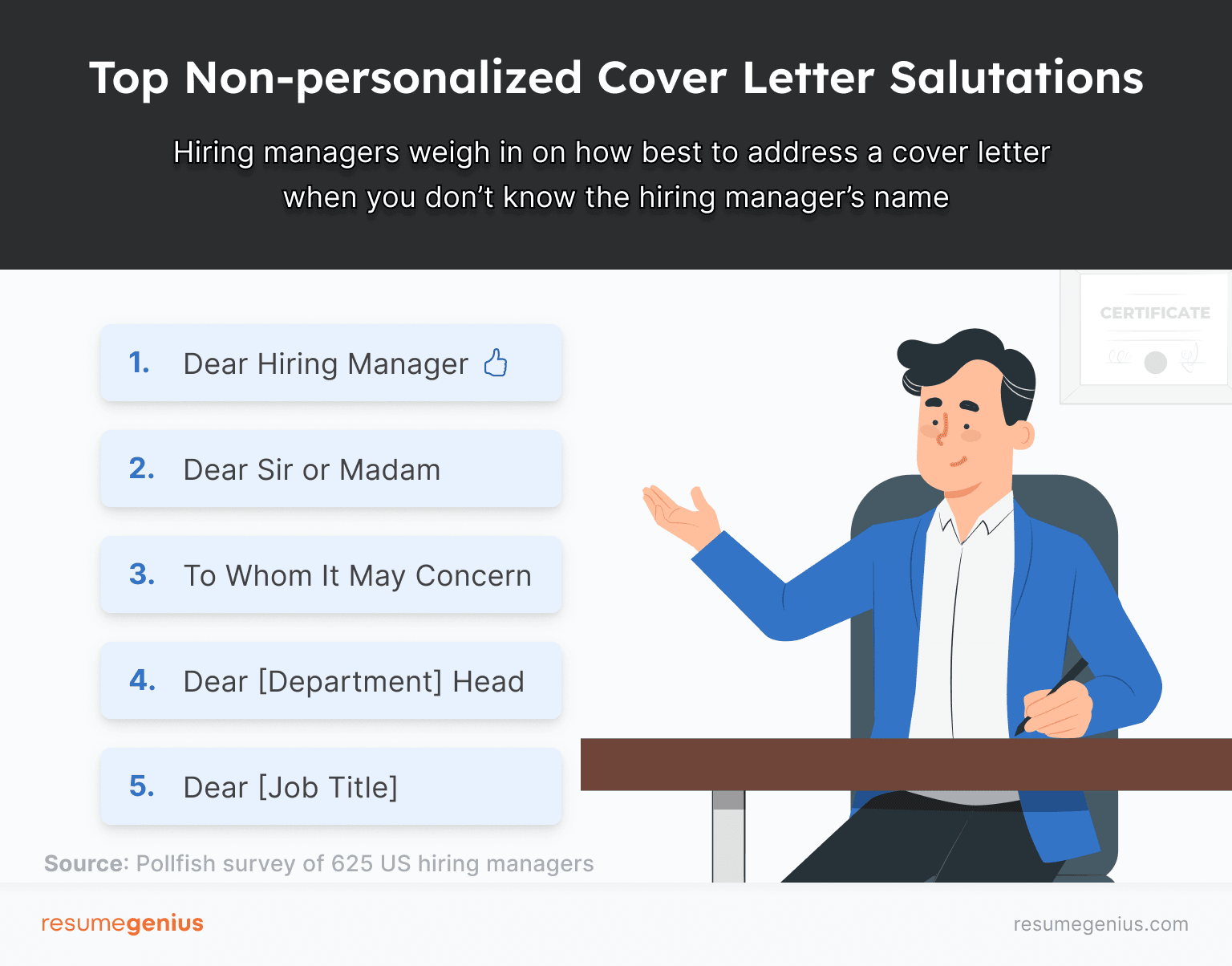
- Hiring managers considered addressing them by name in the salutation as the least important customization of your cover letter.
- However, 31% of men compared to 22% of women hiring managers believed it’s very important to customize the salutation of your cover letter.
- Hiring managers shared that “Dear Hiring Manager” was the most preferred and “Dear [Job Title]” was the least preferred of non-personalized salutations on a cover letter.
- Hiring managers said they most preferred to receive cover letters as PDFs, and least preferred receiving cover letters as paper documents in the mail.
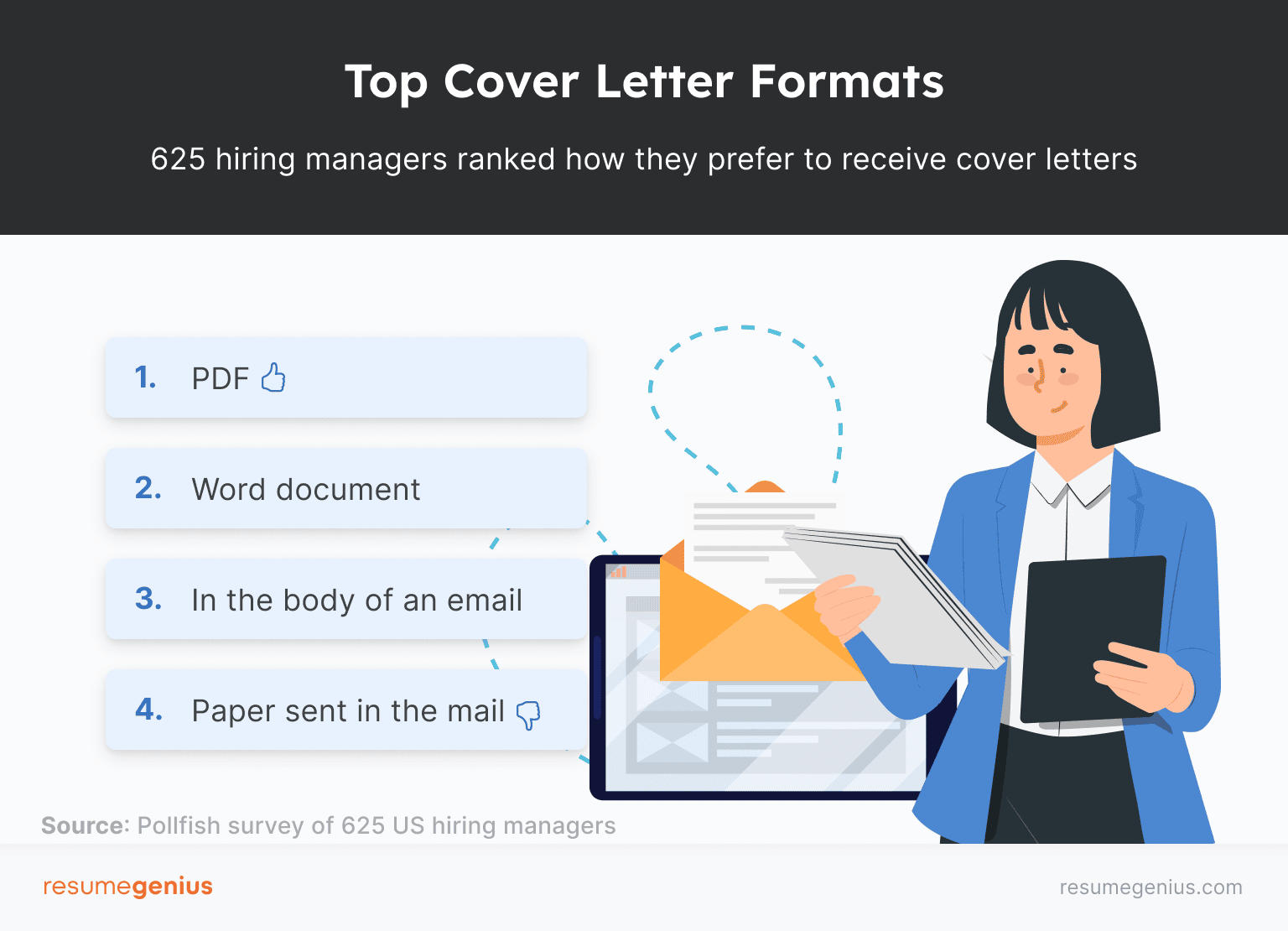
How long should my cover letter be?
- Among hiring managers who read cover letters, the average preferred length for a cover letter was about 400 words.
- Hiring managers who view cover letters as important tended to prefer longer cover letters than hiring managers who classify cover letters as unimportant.
What is the most important part of my cover letter?
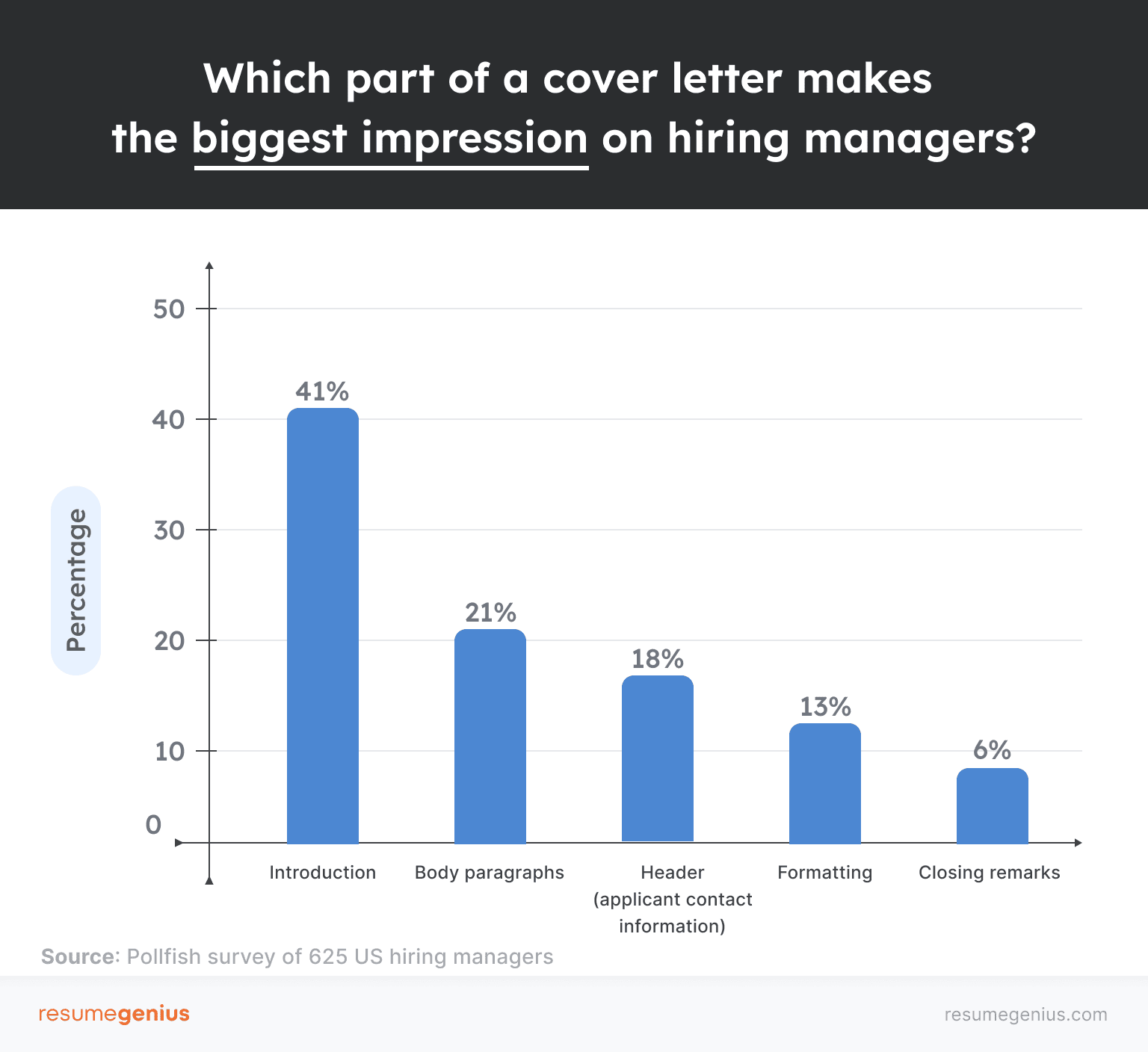
- 41% of hiring managers reported that the introduction is the section of a cover letter that leaves the biggest impression on them.
- 21% of hiring managers reported that the body paragraphs of a cover letter leave the greatest impression on them.
- 18% of hiring managers said the applicant’s contact information (header) is the section that leaves the biggest impression on them.
- Only 13% and 6% of hiring managers reported that a cover letter’s format and closing remarks, respectively, leave the biggest impression.
Expert takeaway: an effective cover letter is customized, concise, and starts strong
According to hiring managers, applicants should customize their cover letter to the position and company they’re applying for, including matching the skills in the job posting, mentioning the company’s goals, using the company’s name, and addressing the hiring manager by name if possible.
No single cover letter section was dramatically more important to customize than another, suggesting that applicants should aim to tailor all sections of their cover letter to the job opening. Overall, male hiring managers were more likely than female hiring managers to consider customizing your cover letter as very important.
Lastly, a successful cover letter is short, starts with an engaging introduction to hook the reader, and is submitted as a PDF (if the file format is not specified in the job posting or application portal). Approximately 400 words is long enough to detail your qualifications while short enough to read for busy hiring managers.
Methodology
625 hiring managers (either as their main role or as one of their job duties) were surveyed using Pollfish. Survey respondents were 55% male and 45% female. Percentages from our survey have been rounded to the nearest percentage point for ease of reference. All analysis was performed using R. For access to data, please contact geoff@resumegenius.com.
References
- Tomaszewski, M. (2019). Is a cover letter necessary in 2023? Do I need a cover letter in 2023? ResumeLab. https://resumelab.com/cover-letter/are-cover-letters-necessary
- Ladders. (2019). Do cover letters still matter? Here’s what data shows. Ladders. https://www.theladders.com/career-advice/do-cover-letters-still-matter-heres-what-data-shows
- Harkusha, S. (2020). HR statistics you need to know for 2023. GetCoverLetter. https://www.getcoverletter.com/blog/hr-statistics
- Yang, P. (2020). Cover letters: Just how important are they? ResumeGo. https://www.resumego.net/research/cover-letters/

